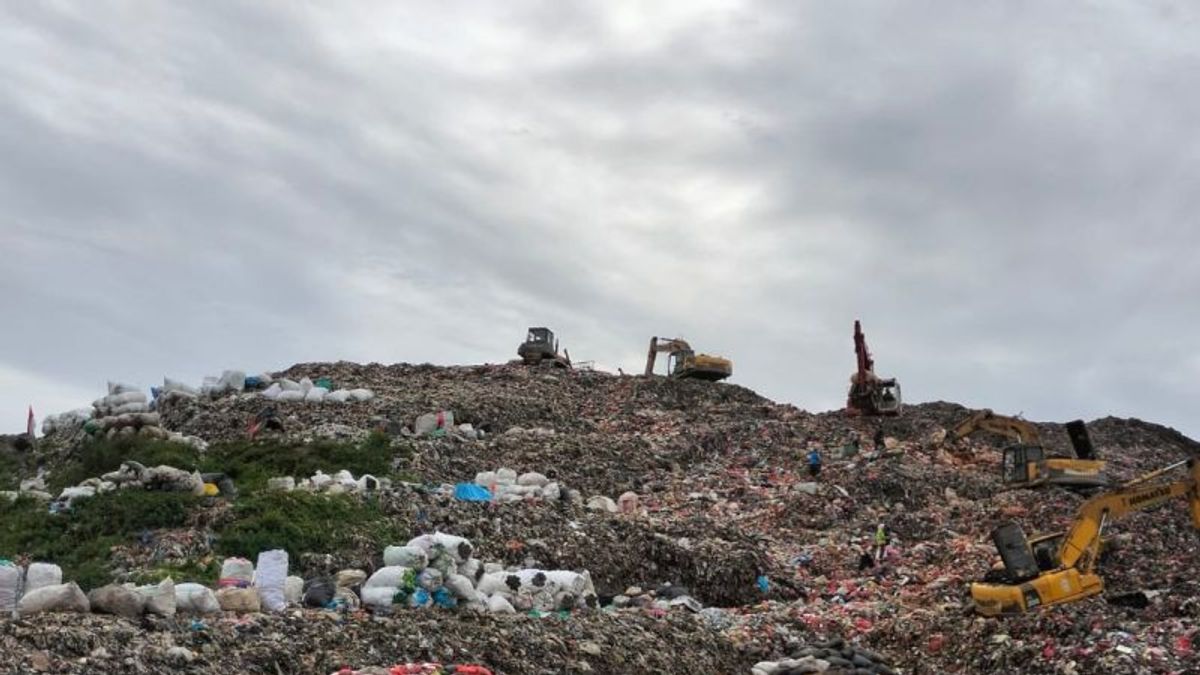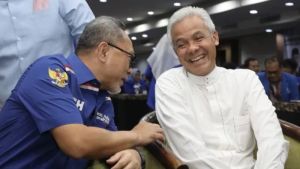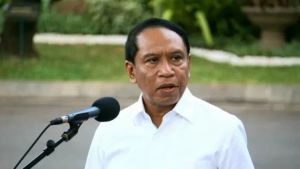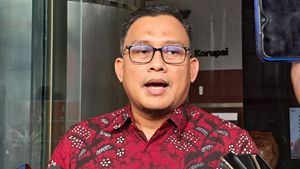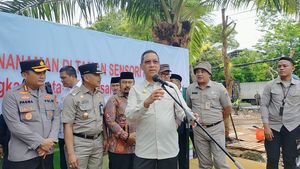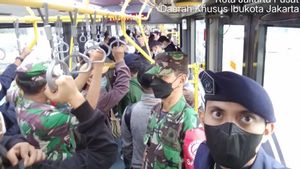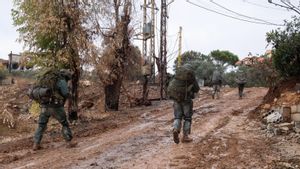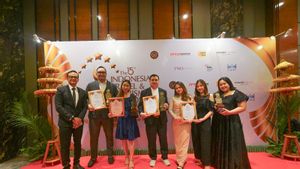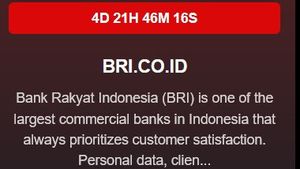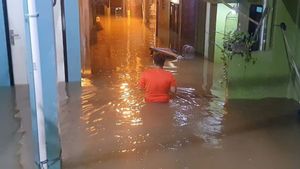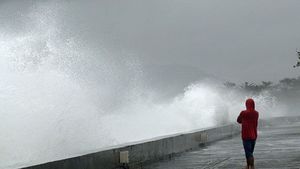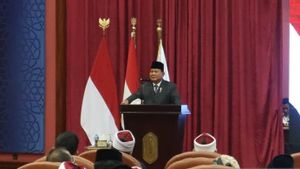JABAR - The Bekasi Regency Government (Pemkab) is faced with serious problems related to waste management with the demand to immediately find a permanent solution so that it can be released from the waste emergency status.
With a population of more than three million people and known as an industrial area with 11 large industrial areas and 7,339 companies that have been established, the waste production in Bekasi Regency has now reached 2,600 tons per day.
The waste is generated from households, markets, 'rivers', to factory waste. Every day officers transport waste to the local government's Final Disposal Site (TPA) located in Burangkeng Village, Setu District.
Of the total 2,600 tonnes of waste generated per day, the local government is only able to transport 600 tonnes, while another 2,000 tonnes are still scattered. Hundreds of tons of waste were transported to the Burangkeng TPA.
In fact, based on the results of a study in 2019, the condition of the land at the landfill which has been in operation for more than 20 years is now no longer able to accommodate waste or has overcapacity since 2020.
On the other hand, the paradigm of handling waste through collecting, transporting and slowly disposing of waste must also be abandoned, because it will only make waste pile up in the TPA.
As a result, mountains of garbage have become a daily sight for residents around the Burangkeng TPA. In fact, it also causes worry because it often causes landslides to close access to environmental roads.
Land Expansion
Since last year, the Bekasi Regency Government has been working on an additional 2.1-hectare Burangkeng TPA land to prevent landslides as well as temporarily accommodate waste, at least within the next year.
The process of expanding the land is currently still ongoing and 17 owners of land additions have also approved the plan. Surveys have also been carried out up to sector benchmarking, all that remains is to wait for the results of the calculation of 'profit' compensation through the public appraiser service office.
This year the local government also plans to add another five hectares of the Burangkeng TPA area to the zone that leads to the border of Bekasi City. This plan is in the study phase regarding roads and rivers so that waste does not enter the area.
It seems that the plan to add five hectares of land has not gone completely smoothly because it requires regulatory changes related to Regional Spatial Planning (RTRW), including those related to land use plans by the central and provincial governments.
Instead of expanding, the 11.6-hectare Burangkeng landfill is in danger of shrinking by two to three hectares due to the impact of the Jakarta-Cikampek II Toll Road development project.

Bekasi Regency is also crossed by the Jakarta-Cikampek II Toll Road which stretches from Purwakarta to Bekasi City. Development in Bekasi Regency is in section II, starting from Setu to Taman Mekar along 24.85 kilometers. In Setu, a toll gate will also be built.
Based on the development map, there is Burangkeng TPA land which is affected by the toll road construction, although it is not yet known exactly how much land will be used and what the land replacement scheme will be.
The Bekasi Regency government was also asked to approach the central government with the aim of synchronizing it so that the waste management plan is implemented and the development of national strategic projects is not disrupted.
Technology-based processing
The local government plans to process waste based on Refused Derived Fuel (RDF) technology with a cooperation scheme, utilizing the area of land expansion that is being pursued.
Acting (Pj) Bekasi Regent, Dani Ramdan also visited a private company on Jalan Mayor Oking Jayaatmaja Citeureup, Bogor Regency, last weekend. The effort is to discuss follow-up cooperation which is believed to be able to reduce the volume of waste.
Based on Antara's report, the working visit was part of an effort to finalize a plan to build a waste processing plant at the Burangkeng TPA that turns waste into fuel for cement factories. This waste processing facility is realized after an agreement is stated in the memorandum of understanding of cooperation.
The cement company welcomes the Bekasi Regency Government's plan by agreeing to procure a waste processing facility at the Burangkeng TPA.
He also stated that through the results of intensive discussions, the signing of a joint memorandum of understanding regarding cooperation in waste processing in Bekasi Regency could be realized within the next one to two months.

This waste processing collaboration plan is in line with the policies of the Ministry of Environment and Forestry of the Republic of Indonesia regarding a number of efforts to optimally manage waste in the downstream sector at the final processing site.
Some of the technologies used are converting waste that is flammable and has a high calorific value, such as plastic, paper, cloth, leather, and rubber into RDF products.
RDF is a solid substitute fuel for coal used in power plants and cement factories. Managing waste into RDF products can reduce the need for landfill land while improving environmental quality.
Several waste power plants or PLTSa are already operating in Solo and Semarang, Central Java Province.
This project is a government collaboration program with business actors in utilizing energy from waste to reduce methane gas emissions by up to 30 percent in 2030, and realize the target of carbon neutrality in 2060.
Through various strategies for handling and reducing waste from the upstream to downstream sectors, the government hopes that there will be no more construction of new landfills in 2030, and Indonesia can be free from landfills starting in 2040.
Specific strategy
Dani Ramdan added that a special strategy was needed for waste management considering that geographically Bekasi Regency is a downstream area with a total of 600 tons of waste per day that goes to landfills.
"By 2024 we must have an even more basic solution because if we only increase the area, it will not solve it fundamentally. We will do it with two strategies, waste at the Burangkeng TPA is processed, and waste from (home) sources is also reduced," he said.
The first strategy is to continuously optimize the performance of the cleaning staff at the Bekasi Regency Environmental Service. Every day, from Monday to Friday, officers collect garbage from residents' homes, markets, and factories. While Saturday-Sunday they collect garbage from the river.
The Bekasi Regency Government this year also plans to build waste processing and collecting installations in a total of 16 rivers which are indicated to be often used as garbage dumps.
The local government will also encourage this processing by building integrated waste processing sites at the sub-district, village or sub-district level, to waste banks at the RT/RW level.
Schemes for recycling waste with economic value such as maggot cultivation, compost, and creative economic products are also attempted to be able to get maximum results but it requires a change in the basic attitude of the community.
Community Appeal
The Bekasi Regency Government is constantly appealing to all residents to contribute to keeping the environment clean by not littering.
The behavior of littering, including in rivers, has an impact on environmental damage. Out of a total of 40 rivers that cross Bekasi Regency, 16 of them are critical status due to pollution from both factory waste and household waste.
VOIR éGALEMENT:
The local government invites all residents to love and protect the environment through a number of conservation efforts such as cleaning and sorting waste. The behavior of not throwing garbage anywhere is believed to be able to become a snowball, from small efforts to rolling large and finally being able to move people's awareness.
The local government also continues to work to raise awareness for every household to handle waste independently through composting and magot cultivation for organic waste as well as sorting activities and making handicrafts for inorganic waste which is not easily decomposed.
Through community collaboration with the government and industry players, and supported by the use of technology, the completion of waste management in Bekasi Regency is not something impossible.
The English, Chinese, Japanese, Arabic, and French versions are automatically generated by the AI. So there may still be inaccuracies in translating, please always see Indonesian as our main language. (system supported by DigitalSiber.id)
